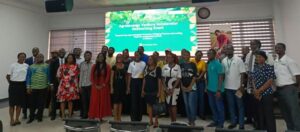By Juliet ETEFE ([email protected])
Deputy Executive Director-Centre for Indigenous Knowledge and Organisational Development, Wilberforce Laate has expressed concern over lack of policy continuity in key sectors, which he believes is undermining the country’s development efforts.
According to him, the constant shift in agricultural policies driven by changing political party agendas has significantly hindered long-term progress in the sector.
Speaking on the issue, Mr. Laate highlighted the recurring problem of governments abandoning initiatives started by their predecessors in favour of fulfilling their party manifestos.
He emphasised that agriculture, as a critical sector of Ghana’s economy, requires a consistent, long-term approach that transcends political cycles.
“Party A comes with a policy and leaves, then Party B comes with another. There’s no continuity because they are focused on implementing what is in their manifestos, which are smaller than the country’s broader needs.
“Ghana is bigger than political manifestos, so why should we leave our development in the hands of political parties to decide the direction we should go? Agriculture policies should not be tied to manifestos,” he stated.
To address the issue, the expert proposed that political parties should align their manifestos with a national development agenda.
He said political parties should not throw away the national agenda to implement their manifestos. Instead, they should use the national agenda as a foundation and skew it slightly toward their priorities to ensure continuity and progress regardless of which party is in power.
He made these remarks in an interview on the sidelines of the Innohub Agroecology Venture Accelerator Networking Event themed ‘Empowering Agroecological Ventures: Bridging Finance and scaling Gaps for sustainable growth in Ghana’, held at the University of Ghana (WACCI) auditorium.
The call for policy continuity resonates with broader need for governance reforms in the country, as many analysts argue that a well-defined national development framework could serve as a guiding document to ensure all governments, regardless of political affiliation, work toward common goals.
For instance, the National Development Planning Commission (NDPC) advocated similar sentiments as it introduced its strategic framework – a policy framework that aims to align development efforts from the national level to local communities.
The framework, based on Ghana’s Vision 2057, is a long-term national development policy that seeks to serve as a key unifying strategy to guide a series of medium-term plans and annual action plans implemented across all governance structures and sectors in the country over the next 34 years.

Sustainable funding for agroecology
The Innohub Agroecology Venture Accelerator Networking Event aims to promote agroecology, explore financing and growth opportunities, share success stories and foster networking among key stakeholders.
It saw experts and sector players including Chief Executive Officer-Songtaa Tietaa, Anita Sutha; Executive Director-Ropryn Company Limited, Prince Manu Yeboah; and Mr. Wilberforce Laate advocating for agroecology as a sustainable approach for the agriculture sector.
They noted that agroecology – a sustainable farming approach that emphasises organic and environmentally friendly practices – is an area which has not received sufficient support.
As such, they called on government to intentionally invest in agroecology for food sovereignty and also encouraged farmers to prioritise book-keeping to attract funding.
Mr. Laate specifically referenced the Planting for Food and Jobs initiative, which he said lacks a comprehensive strategy to support sustainable agricultural practices like agroecology.
“When they introduced Planting for Food and Jobs, the focus was largely on chemical fertilisers – but I know in the first planting for food and jobs they made some allocation for organic manures and those things. Farmers were complaining that lot of the stuff went out because they were not formulated.
“In some cases, they contained more filler materials than the essential nutrients needed for effective farming. If we are intentional about it, then we will be looking at having something that is tried and tested,” he lamented.
Programme Coordinator at Innohub, Marigold Larbie, advocated partnerships between stakeholders and sustainable agribusinesses and recommended providing incentives such as financial support and capacity-building training.
These measures, she believes, will foster a healthier environment, promote healthier food production and drive the agroecological sector’s long-term growth in Ghana.
By bringing together financial institutions, partners and stakeholders, the event fosters collaboration that advances sustainable agriculture in Ghana and empowers small-scale entrepreneurs to scale their operations.










